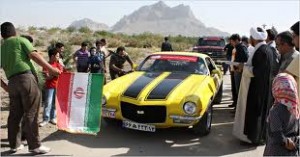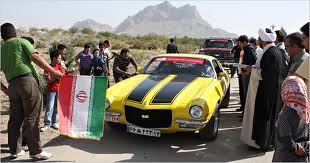 DUBAI, Dec 20 (Reuters) - Snow falls heavily on the busy street. A fresh white blanket blurs the sleek lines of a Dodge Challenger - an iconic vehicle that defines the United States' love affair with muscle cars.
DUBAI, Dec 20 (Reuters) - Snow falls heavily on the busy street. A fresh white blanket blurs the sleek lines of a Dodge Challenger - an iconic vehicle that defines the United States' love affair with muscle cars.This is not New York, Montreal or Tokyo but Tabriz, a city in north-west�Iran�showcasing the latest American�autos�to a country where they are still largely banned.
Before the Islamic Revolution in 1979,�Iran�was a flourishing marketplace for U.S.-manufactured cars and trucks, but a combination of U.S. sanctions barring most trade and Iran's own restrictions have blocked sales.
Yet since last year, hundreds of the most sought-after American and European car models have appeared in Tabriz from a nearby free trade zone close to Armenia and Azerbaijan, an example of how sanctions rarely stop the flow of luxury goods.
Numerous images and videos, like the one of the snow-covered Challenger, have been posted online by dealers, owners and enthusiasts, testament to number of top-of-the-range vehicles appearing in the region.
They are also a clear sign, if one were needed, of the enormous potential market Iran offers to U.S. auto giants if an initial agreement between the Islamic Republic and world powers leads to a permanent settlement of their dispute over Tehran's nuclear programme and the lifting of trade embargoes.
"We see amazing cars here now. There's huge interest because there've been no American cars in Iran for many years," said Mohammad, a sales manager working for one of around 20 businesses importing U.S. cars into Iran. "It's good�business�for us."
FREE ZONE TRADE
The Aras free zone established eight years ago in the north-west of the country began allowing car imports last year, putting it in prime position as a key conduit for trade if the diplomatic thaw between Iran and the West continues.
While the Islamic Republic bars imports of�autos�from the United States - which severed ties in 1980 after its diplomats were taken hostage - Aras benefits from exemptions allowing imports of vehicles from third countries with little or no tax.
Businesses contacted by Reuters say more than 1,500 have been sold in Aras since the first half of 2012. More than half of those are American brands - including Chevrolet, GMC, Cadillac,�Ford�and Dodge.
"I have four Chevrolet Camaros at the moment - they're seriously popular. But my most expensive car now is an Audi Q7, for $74,000," said Mohammad.
Online postings show shiny new U.S. vehicles with Aras free zone license plates set off by blue skies and mountains or street scenes in Tabriz, Iran's fourth largest city. One video shows a bright red Lamborghini Aventador weaving through the traffic. It sold some months ago for around $400,000.
Under the terms of the free zone, only those connected to it - residents or registered businesses - can buy the vehicles. Their owners can drive them inside the zone itself but also to Tabriz, the provincial capital of Eastern Azerbaijan.
Owners can also get a temporary licence plate to drive free zone cars in the rest of Iran for two months a year, arguably a great branding opportunity in a country which has few remaining classic Chevrolets and Fords from the pre-revolutionary era, when U.S. cars and trucks were a common sight.
TESTING THE WATER
In June this year one company registered in Aras took out adverts in the Iranian media offering customers the opportunity to buy Chevrolet models without any restrictions.
According to a report by the student news agency (ISNA), one advertisement showed a picture of a Chevrolet with the slogan, "the return of a legend after 34 years".
Directors of the company - El Khodro Aras - say the offer is entirely lawful and has been met with significant interest from potential customers.
Six months on, there is no sign yet they have succeeded in supplying the open market in Iran, but sources familiar with the situation say the government itself is encouraging Iranian companies to find ways to bring in U.S. cars and trucks.
"The government is not just looking at imports of U.S. cars but one day having an assembly line here. It's too early for that now but that's what they're after," an Iranian businessman who is involved in the Iranian auto�business�said. It was not possible to reach Iranian government officials for comment.
For several years before the revolution, General Motors, was in partnership with an Iranian company to assemble autos.
Similar partnerships by French, South Korean and Japanese competitors have been established in recent years. While mothballed through increasingly tough sanctions, they have a clear head-start over U.S. companies.
An automotive conference in Tehran that took place six days after the interim nuclear agreement was signed was attended by representatives of many international car makers.
There were no signs of any representatives of U.S. firms, which are subject to comprehensive trade embargoes not lifted under the interim nuclear deal, but insiders say they are as ready as anyone else for the rules to change.
"Iran is a huge market and everyone is on the starting block waiting for sanctions to be lifted. As soon as that happens, they'll be in," said a source familiar with the Iranian car market.
Sources in Aras say some vehicles are shipped from the United Arab Emirates to Bandar Abbas or Bandar Lengeh - ports in southern Iran - and transported by truck more than 1,200 miles (2,000 km) across the country to Aras.
Others are imported from Iraqi Kurdistan and Georgia, said another Aras auto trader.
General Motors said it was not present at the conference and adheres to all U.S. sanctions against Iran. It said it had no knowledge of the trade in GM cars in Aras free zone and that it and its authorised dealers had no activity in Iran.
Ford�has also denied knowledge of third-party importers into Iran and says it follows all sanctions requirements. According to a source with direct knowledge of the matter, it has been identifying potential distribution partners in Iran so that it can move quite quickly when the time comes.
FAST-GROWING MARKET
There is little doubt about the potential prize on offer. Production by Iran's domestic car industry, unusually developed for the Middle East, peaked at 1.6 million cars in 2011, the year crippling new sanctions were introduced.
Rich in natural resources and with a population of more than 75 million people, there is no lack of demand either.
Imported cars are taxed heavily in Iran, more than doubling their price to protect its domestic industry, but international brands which are exported to Iran in parts and assembled there are subject to much lighter taxes.
That is the business model of French manufacturers Renault and Peugeot. Both have been active in Iran in recent years, contributing to the production of more than half a million cars in 2011, around a third of Iran's total output that year.
Ever tougher sanctions imposed by the United States and European Union in 2012 have forced them to withdraw from the lucrative partnerships.
But they are hoping for a quick resumption of activities following the initial nuclear deal, which offers a six month suspension on trade sanctions on selected goods including auto parts in return for a curb on key parts of Tehran's nuclear programme to allay Western fears it has military aims.
Iran says its nuclear development is purely peaceful.
There is little clarity yet on how and when the deal will be implemented but analysts says Iran has the potential to be a profitable and fast-growing auto market exceeding 2 million vehicles annually in the event of a sustained diplomatic thaw.
Even in the best case, that will be some time in the making, but Aras sales manager Mohammad hopes the ban by Iranian authorities on importing U.S. cars to the general market will change much sooner.
"We don't know what the future brings but we hope the authorities will amend the rules," he said.
"If that happens, demand will rocket and so will our business."
By Reuters
The Iran Project is not responsible for the content of quoted articles











